- Home
- John Irving
A Prayer for Owen Meany Page 2
A Prayer for Owen Meany Read online
Page 2
The local sagamore’s name was Watahantowet; instead of his signature, he made his mark upon the deed in the form of his totem—an armless man. Later, there was some dispute—not very interesting—regarding the Indian deed, and more interesting speculation regarding why Watahantowet’s totem was an armless man. Some said it was how it made the sagamore feel to give up all that land—to have his arms cut off—and others pointed out that earlier “marks” made by Watahantowet revealed that the figure, although armless, held a feather in his mouth; this was said to indicate the sagamore’s frustration at being unable to write. But in several other versions of the totem ascribed to Watahantowet, the figure has a tomahawk in its mouth and looks completely crazy—or else, he is making a gesture toward peace: no arms, tomahawk in mouth; together, perhaps, they are meant to signify that Watahantowet does not fight. As for the settlement of the disputed deed, you can be sure the Indians were not the beneficiaries of the resolution to that difference of opinion.
And later still, our town fell under Massachusetts authority—which may, to this day, explain why residents of Gravesend detest people from Massachusetts. Mr. Wheelwright would move to Maine. He was eighty when he spoke at Harvard, seeking contributions to rebuild a part of the college destroyed by a fire—demonstrating that he bore the citizens of Massachusetts less of a grudge than anyone else from Gravesend would bear them. Wheelwright died in Salisbury, Massachusetts, where he was the spiritual leader of the church, when he was almost ninety.
But listen to the names of Gravesend’s founding fathers: you will not hear a Meany among them.
Barlow
Blackwell
Cole
Copeland
Crawley
Dearborn
Hilton
Hutchinson
Littlefield
Read
Rishworth
Smart
Smith
Walker
Wardell
Wentworth
Wheelwright
I doubt it’s because she was a Wheelwright that my mother never gave up her maiden name; I think my mother’s pride was independent of her Wheelwright ancestry, and that she would have kept her maiden name if she’d been born a Meany. And I never suffered in those years that I had her name; I was little Johnny Wheelwright, father unknown, and—at the time—that was okay with me. I never complained. One day, I always thought, she would tell me about it—when I was old enough to know the story. It was, apparently, the kind of story you had to be “old enough” to hear. It wasn’t until she died—without a word to me concerning who my father was—that I felt I’d been cheated out of information I had a right to know; it was only after her death that I felt the slightest anger toward her. Even if my father’s identity and his story were painful to my mother—even if their relationship had been so sordid that any revelation of it would shed a continuous, unfavorable light upon both my parents—wasn’t my mother being selfish not to tell me anything about my father?
Of course, as Owen Meany pointed out to me, I was only eleven when she died, and my mother was only thirty; she probably thought she had a lot of time left to tell me the story. She didn’t know she was going to die, as Owen Meany put it.
Owen and I were throwing rocks in the Squamscott, the saltwater river, the tidal river—or, rather, I was throwing rocks in the river; Owen’s rocks were landing in the mud flats because the tide was out and the water was too far away for Owen Meany’s little, weak arm. Our throwing had disturbed the herring gulls who’d been pecking in the mud, and the gulls had moved into the marsh grass on the opposite shore of the Squamscott.
It was a hot, muggy, summer day; the low-tide smell of the mud flats was more brinish and morbid than usual. Owen Meany told me that my father would know that my mother was dead, and that—when I was old enough—he would identify himself to me.
“If he’s alive,” I said, still throwing rocks. “If he’s alive and if he cares that he’s my father—if he even knows he’s my father.”
And although I didn’t believe him that day, that was the day Owen Meany began his lengthy contribution to my belief in God. Owen was throwing smaller and smaller rocks, but he still couldn’t reach the water; there was a certain small satisfaction to the sound the rocks made when they struck the mud flats, but the water was more satisfying than the mud in every way. And almost casually, with a confidence that stood in surprising and unreasonable juxtaposition to his tiny size, Owen Meany told me that he was sure my father was alive, that he was sure my father knew he was my father, and that God knew who my father was; even if my father never came forth to identify himself, Owen told me, God would identify him for me. “YOUR DAD CAN HIDE FROM YOU,” Owen said, “BUT HE CAN’T HIDE FROM GOD.”
And with that announcement, Owen Meany grunted as he released a stone that reached the water. We were both surprised; it was the last rock either of us threw that day, and we stood watching the circle of ripples extending from the point of entry until even the gulls were assured we had stopped our disturbance of their universe, and they returned to our side of the Squamscott.
For years, there was a most successful salmon fishery on our river; no salmon would be caught dead there now—actually, the only salmon you could find in the Squamscott today would be a dead one. Alewives were also plentiful back then—and still were plentiful when I was a boy, and Owen Meany and I used to catch them. Gravesend is only nine miles from the ocean. Although the Squamscott was never the Thames, the big oceangoing ships once made their way to Gravesend on the Squamscott; the channel has since become so obstructed by rocks and shoals that no boat requiring any great draft of water could navigate it. And although Captain John Smith’s beloved Pocahontas ended her unhappy life on British soil in the parish churchyard of the original Gravesend, the spiritually armless Watahantowet was never buried in our Gravesend. The only sagamore to be given official burial in our town was Mr. Fish’s black Labrador retriever, run over by a diaper truck on Front Street and buried—with the solemn attendance of some neighborhood children—in my grandmother’s rose garden.
For more than a century, the big business of Gravesend was lumber, which was the first big business of New Hampshire. Although New Hampshire is called the Granite State, granite—building granite, curbstone granite, tombstone granite—came after lumber; it was never the booming business that lumber was. You can be sure that when all the trees are gone, there will still be rocks around; but in the case of granite, most of it remains underground.
My uncle was in the lumber business—Uncle Alfred, the Eastman Lumber Company; he married my mother’s sister, my aunt, Martha Wheelwright. When I was a boy and traveled up north to visit my cousins, I saw log drives and logjams, and I even participated in a few log-rolling contests; I’m afraid I was too inexperienced to offer much competition to my cousins. But today, my Uncle Alfred’s business, which is in his children’s hands—my cousins’ business, I should say—is real estate. In New Hampshire, that’s what you have left to sell after you’ve cut down the trees.
But there will always be granite in the Granite State, and little Owen Meany’s family was in the granite business—not ever a recommended business in our small, seacoast part of New Hampshire, although the Meany Granite Quarry was situated over what geologists call the Exeter Pluton. Owen Meany used to say that we residents of Gravesend were sitting over a bona fide outcrop of intrusive igneous rock; he would say this with an implied reverence—as if the consensus of the Gravesend community was that the Exeter Pluton was as valuable as a mother lode of gold.
My grandmother, perhaps owing to her descendants from Mayflower days, was more partial to trees than to rocks. For reasons that were never explained to me, Harriet Wheelwright thought that the lumber business was clean and that the granite business was dirty. Since my grandfather’s business was shoes, this made no sense to me; but my grandfather died before I was born—his famous decision, to not unionize his shoeshop, is only hearsay to me. My grandmother sold the factory for a considerable profit, and I grew up with her opinions regarding how blessed were those who murdered trees for a living, and how low were those who handled rocks. We’ve all heard of lumber barons—my uncle, Alfred Eastman, was one—but who has heard of a rock baron?
The Meany Granite Quarry in Gravesend is inactive now; the pitted land, with its deep and dangerous quarry lakes, is not even valuable as real estate—it never was valuable, according to my mother. She told me that the quarry had been inactive all the years that she was growing up in Gravesend, and that its period of revived activity, in the Meany years, was fitful and doomed. All the good granite, Mother said, had been taken out of the ground before the Meanys moved to Gravesend. (As for when the Meanys moved to Gravesend, it was always described to me as “about the time you were born.”) Furthermore, only a small portion of the granite underground is worth getting out; the rest has defects—or if it’s good, it’s so far underground that it’s hard to get out without cracking it.
Owen was always talking about cornerstones and monuments—a PROPER monument, he used to say, explaining that what was required was a large, evenly cut, smooth, unflawed piece of granite. The delicacy with which Owen spoke of this—and his own, physical delicacy—stood in absurd contrast to the huge, heavy slabs of rock we observed on the flatbed trucks, and to the violent noise of the quarry, the piercing sound of the rock chisels on the channeling machine—THE CHANNEL BAR, Owen called it—and the dynamite.
I used to wonder why Owen wasn’t deaf; that there was something wrong with his voice, and with his size, was all the more surprising when you considered that there was nothing wrong with his ears—for the granite business is extremely percussive.
It was Owen who introduced me to Wall’s History of Gravesen
d, although I didn’t read the whole book until I was a senior at Gravesend Academy, where the tome was required as a part of a town history project; Owen read it before he was ten. He told me that the book was FULL OF WHEELWRIGHTS.
I was born in the Wheelwright house on Front Street; and I used to wonder why my mother decided to have me and to never explain a word about me—either to me or to her own mother and sister. My mother was not a brazen character. Her pregnancy, and her refusal to discuss it, must have struck the Wheelwrights with all the more severity because my mother had such a tranquil, modest nature.
She’d met a man on the Boston & Maine Railroad: that was all she’d say.
My Aunt Martha was a senior in college, and already engaged to be married, when my mother announced that she wasn’t even going to apply for college entrance. My grandfather was dying, and perhaps this focusing of my grandmother’s attention distracted her from demanding of my mother what the family had demanded of Aunt Martha: a college education. Besides, my mother argued, she could be of help at home, with her dying father—and with the strain and burden that his dying put upon her mother. And the Rev. Lewis Merrill, the pastor at the Congregational Church, and my mother’s choirmaster, had convinced my grandparents that my mother’s singing voice was truly worthy of professional training. For her to engage in serious voice and singing lessons, the Rev. Mr. Merrill said, was as sensible an “investment,” in my mother’s case, as a college education.
At this point in my mother’s life, I used to feel there was a conflict of motives. If singing and voice lessons were so important and serious to her, why did she arrange to have them only once a week? And if my grandparents accepted Mr. Merrill’s assessment of my mother’s voice, why did they object so bitterly to her spending one night a week in Boston? It seemed to me that she should have moved to Boston and taken lessons every day! But I supposed the source of the conflict was my grandfather’s terminal illness—my mother’s desire to be of help at home, and my grandmother’s need to have her there.
It was an early-morning voice or singing lesson; that was why she had to spend the previous night in Boston, which was an hour and a half from Gravesend—by train. Her singing and voice teacher was very popular; early morning was the only time he had for my mother. She was fortunate he would see her at all, the Rev. Lewis Merrill had said, because he normally saw only professionals; although my mother, and my Aunt Martha, had clocked many singing hours in the Congregational Church Choir, Mother was not a “professional.” She simply had a lovely voice, and she was engaged—in her entirely unrebellious, even timid way—in training it.
My mother’s decision to curtail her education was more acceptable to her parents than to her sister; Aunt Martha not only disapproved—my aunt (who is a lovely woman) resented my mother, if only slightly. My mother had the better voice, she was the prettier. When they’d been growing up in the big house on Front Street, it was my Aunt Martha who brought the boys from Gravesend Academy home to meet my grandmother and grandfather—Martha was the older, and the first to bring home “beaus,” as my mother called them. But once the boys saw my mother—even before she was old enough to date—that was usually the end of their interest in Aunt Martha.
And now this: an unexplained pregnancy! According to my Aunt Martha, my grandfather was “already out of it”—he was so very nearly dead that he never knew my mother was pregnant, “although she took few pains to hide it,” Aunt Martha said. My poor grandfather, in Aunt Martha’s words to me, “died worrying why your mother was overweight.”
In my Aunt Martha’s day, to grow up in Gravesend was to understand that Boston was a city of sin. And even though my mother had stayed in a highly approved and chaperoned women’s residential hotel, she had managed to have her “fling,” as Aunt Martha called it, with the man she’d met on the Boston & Maine.
My mother was so calm, so unrattled by either criticism or slander, that she was quite comfortable with her sister Martha’s use of the word “fling”—in truth, I heard Mother use the word fondly.
“My fling,” she would occasionally call me, with the greatest affection. “My little fling!”
It was from my cousins that I first heard that my mother was thought to be “a little simple”; it would have been from their mother—from Aunt Martha—that they would have heard this. By the time I heard these insinuations—“a little simple”—they were no longer fighting words; my mother had been dead for more than ten years.
Yet my mother was more than a natural beauty with a beautiful voice and questionable reasoning powers; Aunt Martha had good grounds to suspect that my grandmother and grandfather spoiled my mother. It was not just that she was the baby, it was her temperament—she was never angry or sullen, she was not given to tantrums or to self-pity. She had such a sweet-tempered disposition, it was impossible to stay angry with her. As Aunt Martha said: “She never appeared to be as assertive as she was.” She simply did what she wanted to do, and then said, in her engaging fashion, “Oh! I feel terrible that what I’ve done has upset you, and I intend to shower you with such affection that you’ll forgive me and love me as much as you would if I’d done the right thing!” And it worked!
It worked, at least, until she was killed—and she couldn’t promise to remedy how upsetting that was; there was no way she could make up for that.
And even after she went ahead and had me, unexplained, and named me after the founding father of Gravesend—even after she managed to make all that acceptable to her mother and sister, and to the town (not to mention to the Congregational Church, where she continued to sing in the choir and was often a participant in various parish-house functions) … even after she’d carried off my illegitimate birth (to everyone’s satisfaction, or so it appeared), she still took the train to Boston every Wednesday, she still spent every Wednesday night in the dreaded city in order to be bright and early for her voice or singing lesson.
When I got a little older, I resented it—sometimes. Once when I had the mumps, and another time when I had the chicken pox, she canceled the trip; she stayed with me. And there was another time, when Owen and I had been catching alewives in the tidewater culvert that ran into the Squamscott under the Swasey Parkway and I slipped and broke my wrist; she didn’t take the Boston & Maine that week. But all the other times—until I was ten and she married the man who would legally adopt me and become like a father to me; until then—she kept going to Boston, overnight. Until then, she kept singing. No one ever told me if her voice improved.
That’s why I was born in my grandmother’s house—a grand, brick, Federal monster of a house. When I was a child, the house was heated by a coal furnace; the coal chute was under the ell of the house where my bedroom was. Since the coal was always delivered very early in the morning, its rumbling down the chute was often the sound that woke me up. On the rare coincidence of a Thursday morning delivery (when my mother was in Boston), I used to wake up to the sound of the coal and imagine that, at that precise moment, my mother was starting to sing. In the summer, with the windows open, I woke up to the birds in my grandmother’s rose garden. And there lies another of my grandmother’s opinions, to take root alongside her opinions regarding rocks and trees: anyone could grow mere flowers or vegetables, but a gardener grew roses; Grandmother was a gardener.
The Gravesend Inn was the only other brick building of comparable size to my grandmother’s house on Front Street; indeed, Grandmother’s house was often mistaken for the Gravesend Inn by travelers following the usual directions given in the center of town: “Look for the big brick place on your left, after you pass the academy.”
My grandmother was peeved at this—she was not in the slightest flattered to have her house mistaken for an inn. “This is not an inn,” she would inform the lost and bewildered travelers, who’d been expecting someone younger to greet them and fetch their luggage. “This is my home,” Grandmother would announce. “The inn is further along,” she would say, waving her hand in the general direction. “Further along” is fairly specific compared to other New Hampshire forms of directions; we don’t enjoy giving directions in New Hampshire—we tend to think that if you don’t know where you’re going, you don’t belong where you are. In Canada, we give directions more freely—to anywhere, to anyone who asks.

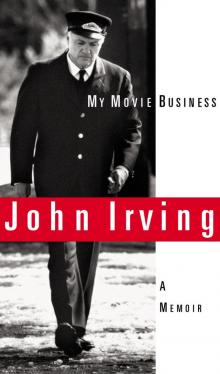 My Movie Business: A Memoir
My Movie Business: A Memoir In One Person
In One Person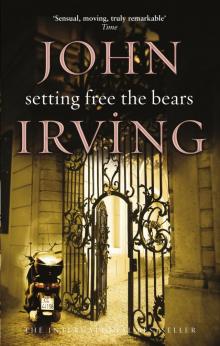 Setting Free the Bears
Setting Free the Bears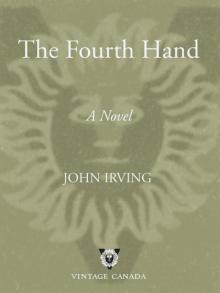 The Fourth Hand
The Fourth Hand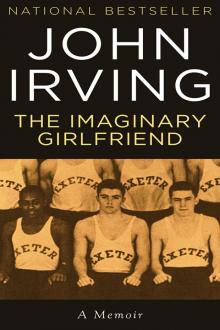 The Imaginary Girlfriend
The Imaginary Girlfriend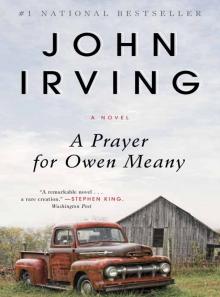 A Prayer for Owen Meany
A Prayer for Owen Meany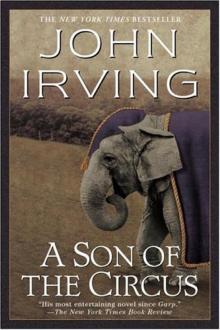 A Son of the Circus
A Son of the Circus Last Night in Twisted River
Last Night in Twisted River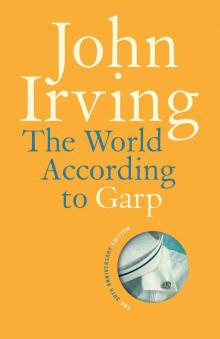 The World According to Garp
The World According to Garp The Cider House Rules
The Cider House Rules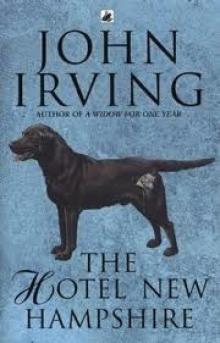 The Hotel New Hampshire
The Hotel New Hampshire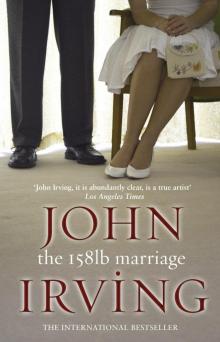 The 158-Pound Marriage
The 158-Pound Marriage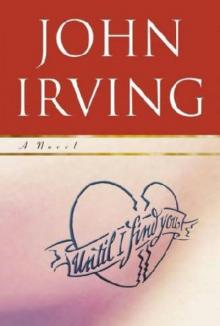 Until I Find You
Until I Find You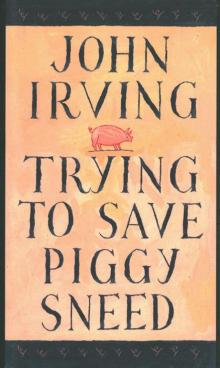 Trying to Save Piggy Sneed
Trying to Save Piggy Sneed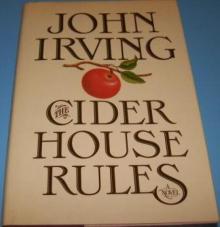 Cider House Rules
Cider House Rules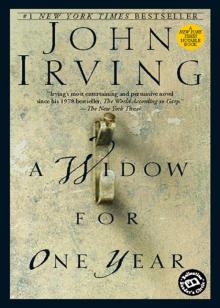 A Widow for One Year
A Widow for One Year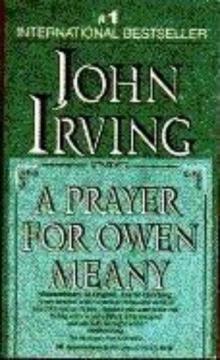 A prayer for Owen Meany: a novel
A prayer for Owen Meany: a novel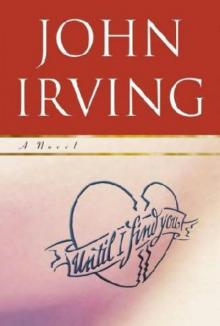 (2005) Until I Find You
(2005) Until I Find You